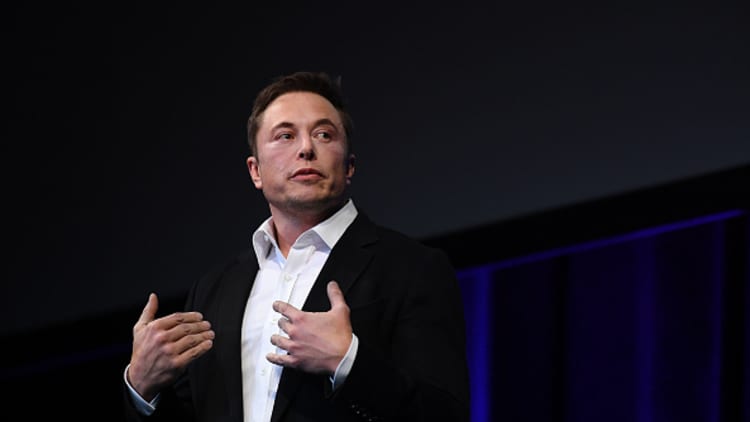
Tesla shareholders have approved by a wide margin a proposal to award Chairman and CEO Elon Musk a massive multibillion-dollar stock grant, a source at the meeting told CNBC.
Musk could earn more than $50 billion over the next several years if Tesla hits certain key milestones and stays on in his current role at the company he co-founded.
The source who reported the vote count declined to be identified. Official vote totals will be announced in a filing with the Securities and Exchange Commission later Wednesday.
The grant gives Musk $2.6 billion in stock options in 12 tranches that each vest as the company hits key performance milestones over 10 years.
Musk needs to hit 12 market capitalization milestones and 16 revenue or earnings before interest, taxes, depreciation and amortization targets in order to vest the entire award. Tesla has to reach a market cap of $100 billion for the first tranche to vest, and then each of the remaining 11 tranches require an additional $50 billion in market value.
In addition to that, there are 16 operational milestones: eight focused on increasing revenue from $20 billion up to $175 billion, and another eight targeting adjusted EBITDA milestones ranging from $1.5 billion to $14 billion.
Each of the 12 tranches vests when Tesla hits a market cap milestone and one of the two kinds of operational milestones.
Throughout all of this, Musk must remain either CEO or executive chairman and chief product officer.
Ultimately, Musk could earn up to $55.8 billion in stock and awards, if Tesla's market cap reaches $650 billion. It is currently around $52 billion. Musk will receive no other compensation for his work at Tesla outside this plan.
Supporters have said the plan will align Musk with shareholders and potentially greatly increase the company's value. They argue shareholders are likely to benefit from Musk's efforts whether or not he hits the targets.
The plan is also meant to keep Musk from jumping ship for one of his other many projects in areas such as commercial space and artificial intelligence. Musk had previously hinted he was considering reducing his responsibilities at Tesla at some point in the next several years.
Finally, the grant is designed to push Tesla toward fulfilling the vision Musk laid out in his "Master Plan," where he outlined a future for Tesla as a fully integrated sustainable energy company and mass-market electric automaker.
"If all of these milestones were to be achieved," said Tesla's proxy statement, "Tesla will have meaningfully achieved its mission of transitioning the world to sustainable energy and will have become one of the most valuable and successful companies in the world. This is our ambition."
Tesla shares were recently trading up almost 4 percent.
"Investors aren't bothered by the fact that Tesla lost more money than people thought they would, or have had continued Model 3 misses," Loup Ventures managing partner Gene Munster told CNBC. "They see a bigger opportunity over the long term, and that opportunity is figuring out the trifecta between energy capture, storage and use."
Some large institutional shareholders supported the proposal, such as T. Rowe Price, which has a 6.4 percent stake in Tesla.
But some analysts are skeptical of the plan.
CFRA analyst Efraim Levy reiterated his sell rating on Tesla after the vote.
"We view the arrangement as a potential win-win for both shareholders and Musk, as the objectives are aligned to a shareholder-friendly combination of aggressive market capitalization objectives as well as a series of operational targets," Levy said. "Still, we question why Musk has to be incentivized so highly given his high equity interest in TSLA and risks to his personal reputation. We view TSLA shares as expensive at current valuations, despite our forecast of 2019 profitability."
And proxy advisors Glass Lewis and Institutional Shareholder Services (ISS) recommended rejecting the proposal, citing its high cost, potential to dilute shares and other issues. Glass Lewis called the sheer upfront cost of the plan "staggering," and said it has serious potential to dilute the stock.
"The absolute costs to shareholders of this grant if approved and earned are substantial, but the amount of share capital used is even more eye watering on a relative basis," the firm said.
ISS said the plan provides "pay opportunities over the next 10 years that dwarf those of top executives at the largest and most profitable public companies."
The firm also said that Musk can earn a lot of money under the plan even if Tesla does not achieve sustained profitability.
"Three-quarters of the award may vest even if the company does not meet any of the commensurate adjusted EBITDA hurdles, the only profitability metric included in the plan," the ISS report said.
Musk and his brother Kimbal recused themselves from the vote. Both are Tesla board members. Musk already owns about 20 percent of Tesla shares, which ISS said was already enough of a stake to consider Musk's interests aligned with those of shareholders.
The vote comes at a time when Tesla shares are dropping from an all-time high set in September, over concerns about the Model 3 production ramp.
— CNBC's Lora Kolodny contributed to this article.



